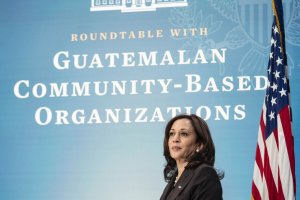
March 18 (UPI) — Vice President Kamala Harris will meet with Guatemala’s President Bernardo Arevalo at the White House later this month to discuss economic opportunities and immigration challenges.
The March 25 meeting will highlight the U.S. commitment to supporting “good governance and democracy in Guatemala” after January’s inauguration of Arevalo, said White House Communications Director Kirsten Allen in making the announcement Monday.
Allen said immigration will be a key component of the vice president’s discussions with Arevalo, saying the two will talk about what’s driving “irregular migration” from northern Central America into the United States.
Those talks are part of the Biden’s administration’s ongoing examination of factors driving immigration from the region and how they can be shaped by U.S. efforts under the administration’s “Root Causes Strategy,” which aims to ensure civilian security, human rights, labor protections and the prevention of gender-based violence.
While Arevalo is in Washington, Harris also will convene a meeting of public and private-sector leaders, Allen said. That meeting will be part of Central America Forward, a public-private partnership that has funneled more than $4.2 billion toward creating and maintaining economic opportunity in northern Central America, officials said.
The March meeting between Harris and Arevalo comes as the Biden administration has targeted corruption in Guatamala as an important factor in immigration of Central Americans into the United States.
In January, the White House targeted two former Guatemalan officials, including former President Alejandro Eduardo Giammattei Falla, with punitive measures over allegations of corruption. Giammattei was barred from entry to the United States and former Ministry of Energy and Mining Alberto Pimentel Mata was sanctioned by the U.S. Treasury, blocking all property in his name and preventing U.S. persons from doing business with him.
Arevalo, of Guatemala’s center-left Movimiento Semilla party, won a surprise victory in last summer’s presidential election by vowing to crack down on corruption in Central America’s most populous country.
